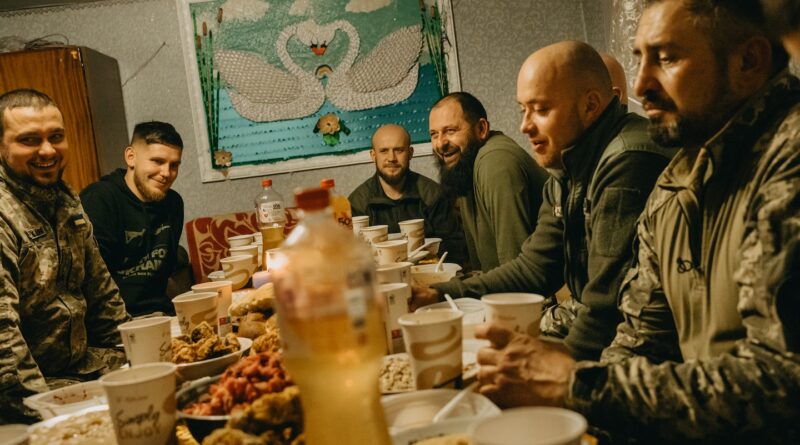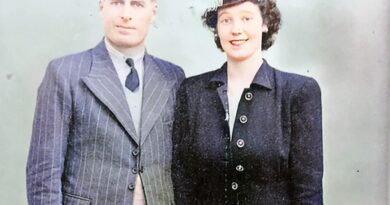Soldiers cook up Christmas tradition on the front line in Ukraine
It was Dec. 24, and Christmas had arrived with the first star in the night sky. Gone are the days of celebrating on Jan. 7, in the tradition of the Eastern Orthodox Church. Ukraine voted in July to move the holiday up by two weeks — another axing of ties with Russia and a symbolic step toward the West.
It was another Christmas at war. Aid has stalled. Ammunition is running low. Victory feels elusive, the battle lines frozen like the weather. And yet they were lucky to be alive — tens of thousands of soldiers like them had already died as the war pressed into a new year.
Now, the men raised their voices in harmony — none louder than Myron’s.
“ … a bright star shined into the whole world!”
The 59-year-old soldier had spent two days cooking Ukraine’s 12 traditional Christmas dishes.
Hunched over a camping stove in the entryway, pots of water boiling, the only window running with water from the steam. Slotting wood into a traditional oven the size of a steamer trunk to bake stuffed cabbage rolls, called holbutsi. Stamping dumplings from homemade dough with a yellow coffee mug. He moved in short, quick movements — his beard frizzy and graying, his laughter quick to explode — as he darted between rooms, through a door propped open with an ironing board.
Myron, who is being identified only by his first name for security reasons, knew the soldiers in his battery were cold and discouraged. They rotated through the trenches, running artillery reconnaissance on Russian forces several kilometers away. Now, they are stationed in a village where blue tarps cover homes where the roofs have been blown off, and vehicle checkpoints are dotted with Christmas trees. It is a blip in a region bearing the scars of last year’s fighting — streets dark and emptied, sunflower fields seeded with mines — even after liberation from Russian occupation last year.
The military post was an abandoned house — two rooms filled with the remnants of someone else’s life. Children’s drawings clung to the wallpaper, and schoolbooks were stacked on the living room shelves. There was no running water, but the heat and electricity worked fine. Here, Myron — a former appliance salesman — had toiled with makeshift equipment, selecting pans from a box on the floor and pulling military rations from a plastic bag. Tradition called for three varieties of fish, three types of bread with salt, on this day cupped in the base of an old water bottle. Quarts of sweet uzvar juice, a pot of honeyed kutia.
It took his mind off his village, near Sambir in western Ukraine, where his granddaughters also were tucking silver coins into their dumplings, greeting another Christmas without him. To bite into a coin, according to festive superstition, is to come into a year of wealth.
“War is war, but I don’t want to feel like [I’m] not at home,” a soldier, Lubomir, 40, told Myron as they cooked.
He sliced open the belly of yet another herring — guts spilling, bones tangled — until the house reeked of fish. Onion peels were scattered on the floor, mixing with concrete and dust.
“At home, we do better,” Myron replied.
At the center of the long table, a thick candle of yellow and blue — Ukraine’s national colors — flickered.
The men’s voices lifted.
“ … They fall on their knees and praise the King-God.”
To share a table was a gift. On the other side of the front lines, Russian soldiers could pinpoint the Ukrainian’s location by triangulating cell tower pings. Their families existed only in photos on silenced phones. Maybe later, Myron thought, he could call his granddaughters on the satellite phone. How many more Christmases like this would there be?
“It’s really hard without my family,” he said. “We call each other, but it’s not the same.”
Five-year-old Katya smiled up at him from his cellphone screen, red sweater with black polka dots. He had passed these Christmas traditions to his son, now 38, who is passing them to Katya and her 14-year-old sister. He taught them not to waste leftover bread dough, baking it in sheets on the stovetop for the cows or stray dogs. To half-undress and bathe in cold well-water before the meal. To eat by flickering light, the overhead bulbs flipped off, the room brightened by candles and the Christmas tree.
Myron had talked with his wife that morning to confirm the recipe for mushroom gravy. She sent a package to him at the house — packets of foraged mushrooms and dried white beans, purple-wrapped chocolates and a box heavy with cake, the frosting speckled with green-and-red sprinkles. The conversation had been too short. It always was.
But on this evening, the soldiers had each other. They arrived from their various posts clean-faced, neatly hooking their military jackets on the wall, packs of Marlboros winking from their pockets. They whispered prayers, a murmur like running water — so many hopes and dreams overflowing. The 29-year-old, uncertain whether he would sign another contract with the military. The 55-year-old, whose cherished daughter had been lost to a heart ailment years ago. The 40-year-old, whose three children are growing up without him.
Myron brought more dishes to the table, until there was no more space on the yellow cloth.
“Let us have as much guns and weapons as we have food,” said Serhii, 47, flashing a gold-toothed smile.
Plastic cutlery clicked against plastic bowls. Better not to waste water washing dishes — if there were even enough dishes to be had. Bread torn, soup slurped. The flash of a lucky coin pillowed inside a dumpling.
The men slowed. Again, the song swelled, long and mournful.
“ … give happy years to our glorious Ukraine.”
And again: “Give happy years to our glorious Ukraine!”
The singing lulled. The soldiers stepped outside, where snow sugared the woods and wheat fields. Twinkle lights hung from the eaves of the house, broken and dark. Their cigarette tips flared in the nighttime.
Somewhere in the distance, soldiers were celebrating in the trenches, unlucky in their rotation. Soon, they would trade places.
But for now, the table was still full.





